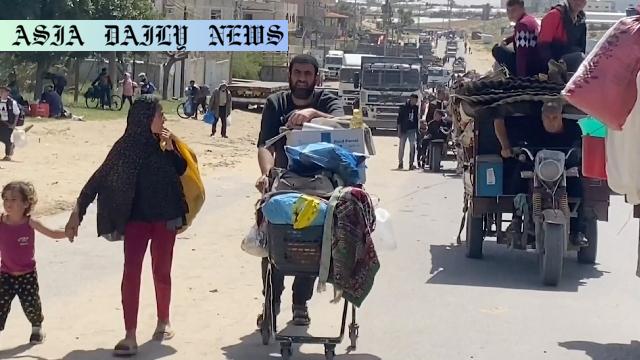Gaza Offensive continues as death toll surpasses 1,000; renewed calls for hostages’ release grow amidst protests in Israel.
Gaza health officials report over 1,000 deaths since renewed conflict began on March 18.
Israel issues evacuation notices in Rafah, escalating its assault in the region.
Protests in Jerusalem pressure Netanyahu for hostage negotiations and ceasefire.
Corruption allegations against Netanyahu aides linked to Qatar negotiations surface.

Resumption of Hostilities: An Alarming Death Toll
The conflict between Israel and Hamas in the Gaza Strip has once again resulted in a heavy toll on human life, with health authorities in the region reporting over 1,000 deaths since the reinitiation of military actions on March 18. Stalled ceasefire negotiations and ongoing disputes have reignited tensions, pushing the situation into a full-fledged conflict. As the offensive intensifies, evacuation notices have been issued across southern Gaza, particularly in the Rafah area, compelling thousands of residents to abandon their homes and seek refuge elsewhere. The humanitarian ramifications of this escalation cannot be understated, with countless lives and livelihoods at risk.
Mounting Pressure on Netanyahu Amid Protests
Within Israel, the situation has sparked widespread unrest, as citizens protest the government’s handling of the conflict and its potential repercussions for Israeli hostages held by Hamas. Demonstrators gathered in massive numbers in central Jerusalem on Monday, urging Prime Minister Benjamin Netanyahu to prioritize negotiations over further military action. Many believe that halting the offensive could lead to the release of hostages, with some protesters advocating that the continuation of violence risks their lives unnecessarily. The rally showcased an underlying public sentiment that prioritizes diplomacy over warfare during an already fraught conflict.
Corruption Allegations and Political Fallout
Prime Minister Netanyahu is facing increased scrutiny on multiple fronts, as reports emerge regarding allegations of corruption involving two of his aides. According to an Israeli media outlet, these individuals are suspected of accepting bribes from a party linked to Qatar, which has played a mediatory role in ceasefire talks with Hamas. These claims, coupled with the political fallout from ongoing military actions, have placed Netanyahu in a precarious position domestically and internationally. Critics argue that these developments cast doubt on the government’s decision-making processes and undermine its credibility in managing the conflict effectively.
Humanitarian Concerns and the Need for Ceasefire
The resumption of Israel’s offensive in Gaza has exacerbated the long-standing humanitarian crisis in the region. The rising death toll highlights the devastating cost borne by civilians amid the violence. Aid organizations and global leaders have called for immediate ceasefire talks to prevent further loss of life and deploy essential relief to those affected on the ground. Analysts argue that continued hostilities will only deepen the divide between both parties, prolonging suffering for those on all sides of the conflict.
International Perspective and Future Implications
The ongoing conflict has drawn significant international attention, with global powers urging Israel and Hamas to reconsider their respective stances and return to the negotiation table. The economic, political, and humanitarian implications of this renewed escalation hold far-reaching consequences, not just for the Middle East but for international relations as a whole. Striking a balance between security concerns and humanitarian responsibilities remains a monumental challenge that demands urgent resolution through cooperation and dialogue.
Commentary
The Human Cost of Conflict
In any armed conflict, it is ordinary civilians who bear the brunt of the devastation. The latest numbers from Gaza highlight the staggering toll that hostilities continue to take on innocent lives. These individuals often find themselves caught in the crossfire, with limited options for escape, as seen with the thousands displaced from their homes in Rafah. The world must remember that behind every statistic is a human story—families shattered, futures uncertain, and communities torn apart. It is imperative that global leaders step up with compassion and urgency, striving for an end to the needless loss and suffering.
Protests Highlight Power of Public Voice
Protests in Israel underline the crucial role of public dissent in times of crisis. Citizens demanding the prioritization of negotiations over military aggression exhibit a mature understanding of the precariousness of their nation’s situation. These protests serve as a reminder that the true essence of democracy lies in the power of the people to question their leaders and push for a more compassionate policy approach. It is vital that the government listens to these voices, considering not just strategic victories but also the human cost of their decisions.
A Call for Accountability and Transparency
The allegations of corruption against Netanyahu’s aides bring to the forefront concerns about accountability in governance during times of conflict. Trust in leadership is an essential component in navigating complex scenarios like this, and any questions of unethical behavior can severely hinder that trust. The government must ensure complete transparency in its dealings, particularly when its actions have such profound implications for lives and international stability.


